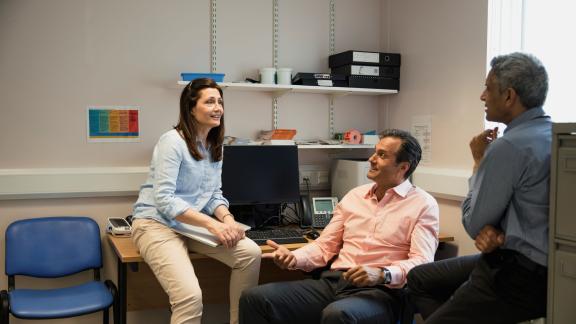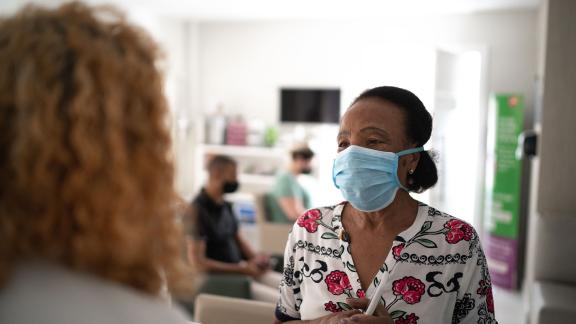How primary care federations have supported the COVID-19 vaccination programme

Primary care federations played a key role in the COVID-19 vaccination programme across England. A member survey from our Primary Care Federation Network summarises the data on the contribution that was made, and how federations are well placed to support local systems with any booster programme, as needed.
Key points
- Primary care federations have played a vital role in the COVID-19 vaccination programme, often leading the programme on behalf of their local area, setting up vaccination centres at short notice and offering workforce support and solutions. This involvement has enabled local systems to benefit from ‘at-scale’ service delivery and reduce pressures and risk on other primary care providers, specifically primary care networks and practices.
- To better understand the scale and nature of this support, the Primary Care Federation Network conducted a member survey in July 2021 to capture insights on the role federations have played. Over 5 million vaccinations have been delivered by the federations surveyed. [1]
- The findings illuminate the extent of primary care federations’ contribution, with over 80 per cent developing initiatives to reach minority/vulnerable groups and more that 95 per cent working in partnership with other organisations to help deliver the programme.
- With the COVID-19 booster programme on the horizon, federations can add value by offering ‘at scale’ delivery that will better enable total coverage, relieve pressure on PCNs and practices, build on what is working well, continue to develop positive relationships with others in the system and increase the mixed economy of provision for patient choice. Over 85 per cent of survey respondents believe federations would be ideally placed to support any COVID-19 booster vaccination programme, either as lead provider or alongside other partners.
The key points from this survey are also summarised in an infographic.
-
[1] We estimate there are approximately 150 federations in England therefore this number is based only on those who completed the survey and provided an exact figure. We expect the true number to be significantly higher than this.
Foreword
In July 2021, the Primary Care Federation Network launched a member survey to find out more about the role of federations in the COVID-19 vaccination programme. Through our engagement with members, we were aware that many federations had supported the programme in their local area. The survey provided an opportunity to understand the scale and nature of this support.
Open from 1 to 12 July 2021, the survey captured details of any support members had provided to the vaccination programme. Sixty-five federations across all NHS regions in England responded, with the results highlighting the vital role federations have played for primary care and the wider COVID-19 response.
Across all regions, federations have been making a real and positive difference, innovating to deliver vaccinations to local communities, and proving their value to local systems. Federations offer support, ‘at scale’ service delivery, opportunities for strong collaboration and remove risks from primary care networks (PCNs) and practices.
Federations are keen to build on this to play a key role in the COVID-19 booster vaccination programme, where it is locally beneficial. The findings from this survey also provide insight into how federations can support their local system in any COVID-19 booster vaccination programme.
Fiona Adamson, Chair, Primary Care Federation Network
Dr Andy Hilton, Vice Chair, Primary Care Federation Network
The role of federations in the vaccination programme
The survey highlighted many ways in which federations have played a vital role in the COVID-19 vaccination programme in their local area. This includes leading the programme on behalf of the local area; setting up vaccination centres at short notice; offering workforce support and solutions; co-ordinating and delivering initiatives to reach local communities; and providing back-office support and infrastructure for practices and PCNs.
This involvement has enabled local systems to benefit from ‘at-scale’ service delivery, as well as reduced pressures and risk on other primary care providers, specifically PCNs and practices. Local systems have also reaped the benefits of existing collaborations between federations and other local organisations, including in the voluntary, community and acute sectors.
Federations that did not directly support the COVID-19 vaccination programme provided other support during the pandemic to relieve pressure from practices and PCNs.
“Feedback from our partners is that they couldn't and wouldn't have done it without us.” South Downs Health and Care
Examples of the role federations have played
Further detail and examples of the role that federations have played in the vaccination programme roll out.
Members’ views on the future vaccination programme
Over 85 per cent of members surveyed believed federations would be best placed to support any COVID-19 booster vaccination programme, either as lead provider or alongside other partners.
Our results showed that delivery models should be flexible to local need and federations will support wherever it was appropriate to do so.
Examples of how federations would add value to the COVID-19 booster vaccination programme include:
- offering at-scale delivery that will better enable total coverage
- relieving pressure on PCNs and practices
- building on what is already working well
- continuing to develop positive relationships with others in the system
- increasing the mixed economy of provision for patient choice.
“Federations could roll booster programmes out quickly and on fewer sites, benefitting from economies of scale to roll out boosters in a short timescale. If combined with flu vaccines, this could take pressure off the practices that are seeing unprecedented demand.” GP Federation in South East
“We are best placed to employ any additional staff needed to support the vaccination programme, however the programme could not run without the support of the local PCNs and practice staff. We are also best placed to support communications and publicity with patients without putting too much additional strain on practices." GP Federation in North East and Yorkshire



